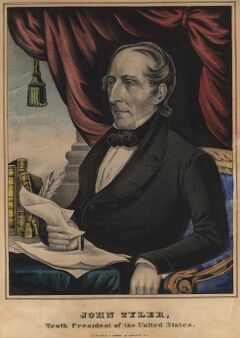John Tyler
John Tyler was the No-President of the United States. He was elected in the 1840 U.S. Presidential Election to be the Vice President of William Henry Harrison. However, in 1841, the latter (and higher-ranking) suffered sudden death from continual outbursts of "No!" from his running mate. Thus Tyler succeeded Harrison as President, the first No-President who was promoted to full-scale President.
Administration[edit]
Many features of American government changed under Tyler. For starters, no one used to assign much importance to who ran for Vice President — even for a sickly figure like Harrison — because Presidents never died in office (until they started to). Moreover, candidates used to pretend they didn't want the office, staying home during their entire campaign. When word finally came that Harrison was at death's door, Tyler stayed behind his own door; he did not travel to Washington, D.C. out of some notion of "continuity of the office" and stand there like a vulture. Once Harrison kicked the bucket, the Cabinet and the Congress decided to play it that Tyler wasn't really the President, which was their only hope of bossing him around — perhaps an "acting" or "interim" President. But Tyler gave a snappy "No!" to that.
As President, Tyler kept saying "No!" to the Congress, in the form of presidential vetoes. Tariffs, a National Bank, paying off the debt, getting the country out of recession — he would not hear of it. Consequently, the Congress all said "No!" to him. Eventually, they rejected his nominees, toyed with amending the U.S. Constitution to make it easier to override his vetoes, and even studied his impeachment. Tyler's crankiness may have developed during the 1840 Presidential campaign, which referred to Harrison as "Tippecanoe" — which is whimsical, or perhaps just plain stupid — but to Tyler as, unimaginatively, "Tyler". If that were not its origin, he certainly developed the attitude given all the pushy sons-of-bitches around him.
Tyler received a state visit from the Shogun of Japan, a lifetime fan of Japan's Noh Theatre. Tyler turned down the chance for an acting career in Japan, in order to continue saying "No!" in the U.S. until his last day in office in 1845. Tyler was thus able to welcome Florida into the Union on that last day, only two days after Texas joined the nation. For each of these two events, "Dr. No" gave a hearty "Yes!"
The reason his last day in office was in 1845, as opposed to 1849 or 1853 or something, is that his cantakerous insistence on providing "leadership" without the Senators of the Whig Party, which elected him, got him disowned from that party without being adopted by the Democratic-Republican Party. That left the Libertarian Party, only it had not been invented yet; and if it had, it might have had second thoughts, given Tyler's fondness for slavery.
Life after Presidency[edit]
Tyler returned to his native Virginia and got elected to the Confederate House of Representatives. He was a leader of the Civil War's first peace conference, saying "No!" to the incipient war.
Later, he became a renowned zombie hunter, nearly succeeding in killing John Adams, as well as causing a mass zombie exodus to Wyoming. Ninja assassin Abraham Lincoln eventually challenged Tyler to a duel, a feat that required Lincoln to travel back in time to 1862 and stab Tyler in the chest. Tyler’s last word was “No!”
Personal life[edit]
Tyler had enough kids for a baseball team, including a DH and a four-person pitching rotation. He named his home Sherwood Forest because he liked the name. His grandkids still live there today, which is crazy. He married twice, wearing out the first one and then finding a replacement.
| Preceded by: William Henry Harrison |
U.S. President 1841–1845 |
Succeeded by: James K. Polk |


